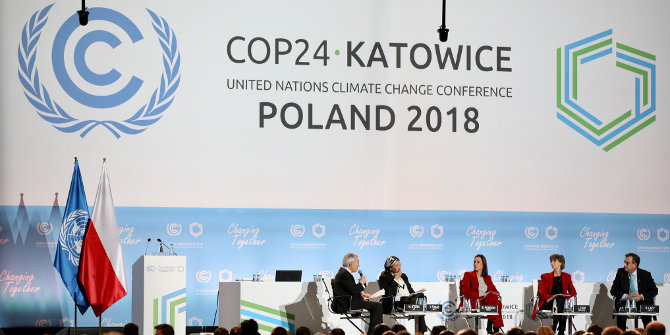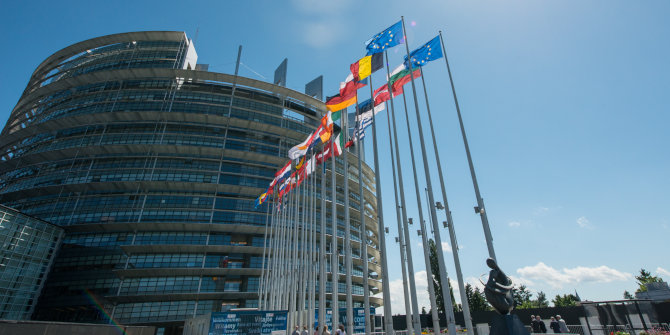Recep Tayyip Erdoğan’s Justice and Development Party (AKP) suffered a disappointing result in the country’s local elections on 31 March. But did the results reflect the beginning of the end for the AKP’s dominance over Turkish politics, or were they simply a consequence of voters backing individual candidates who made convincing appeals to local voters?
The Turkish local elections on 31 March reflected a deepening of internal divisions over the single-party government’s policies in the economic, social and foreign policy realms. But there are two contradicting views about the implications of the elections for the current political leadership.
The first view emphasises that local elections in the country have mostly been driven by citizens’ preferences for individual candidates rather than a candidate’s political party affiliation. Hence, for some analysts the victory of opposition party candidates in big Turkish cities such as Istanbul, Ankara and Izmir, among others, was not directly related to the voters’ evaluations of presidential and governmental performance.
An ardent supporter of the governmental party may vote in favour of the opposition party candidate in local elections. For example, a candidate from a fringe party, the Turkish communist party (TKP), won the municipality of a Turkish city (Tunceli) for the first time in the TKP’s electoral history based on his past mayoral performance in running the district of Ovacık in Tunceli city. This was not based on his party. Moreover, the governing AKP party received the majority of the votes, again consistent with its previous electoral success as AKP candidates won 44% in total and the AKP’s alliance with the nationalist party MHP called “Cumhur ittifakı” won 51.6% of the overall votes in total (around 24 million people) – compared to the main counter-alliance “Millet ittifakı” which won 37.5% (around 17 million votes).

Istanbul, Credit: Robert Anders (CC BY 2.0)
The counterview suggests that President Erdoğan (a former mayor of Istanbul) and his party had risen to the government in 2002 due to their success in local, municipal politics and solidarity networks. Since the 1990s, they had significant leverage on local politics throughout the country, excepting a few secularist cities such as Izmir and Antalya. In this context, the “loss” of Istanbul and Ankara to the main opposition party CHP candidates reflects a deepening crisis of trust in the current governing party and political leadership. According to this view, Turkey’s new presidential system – adopted through a referendum on 16 April 2017 and supported by 51.4% of voters – has altered the traditionally symbolic and impartial status of the President by expanding presidential powers at the expense of the Parliament and local authorities, and by allowing the President to continue to openly represent his political party.
Hence, after becoming the single most powerful actor in national politics, the President is now increasingly perceived as the main scapegoat for the country’s problems such as the recent currency crisis and the Syrian refugee crisis, among others. In addition, the governmental rhetoric that often blames “external forces” for the social, economic and political problems of the country is increasingly perceived by the public as an attempt to evade political responsibility. Furthermore, the overall perception that both governmental agencies and the mainstream media are unable to articulate an autonomous position from the President’s party has played into the hands of the opposition parties who claim they are competing in an unfair setting.
The government’s emphasis on the necessity to unite against internal and external “enemies of the state” such as ultra-secularists, Gulenist Islamists, Kurdish secessionists, and anti-Turkish and Islamophobic groups in the West in particular, has reinforced an atmosphere of insecurity and distrust in the government’s ability to deal with domestic and international crises.
Besides, there are internal power struggles within the party leadership. Increasingly anti-Western and nationalist rhetoric has alienated leading members of the party who advocate a liberal reformist vision, such as former Prime Ministers Ahmet Davutoğlu and Abdullah Gül. There are also accusations of favouritism within the party elites, especially in regard to the candidacy of the former Prime Minister Binali Yıldırım as the party’s mayoral candidate for Istanbul and the rising influence of the President’s son-in-law in party decisions. Party loyalists increasingly face a dilemma in terms of shifting their loyalty from the party to the President.
In the foreign policy domain, Turkey’s tense relations with the EU over the questions of Cyprus and democratic backsliding as well as its dual fear of abandonment and entrapment by its American ally in the Middle East have pushed the Turkish leadership to diversify its strategic alliances – raising concerns in the West that Turkey is “hedging” by seeking rapprochement with Eastern powers such as Russia. The “Atlanticist” (pro-US) circles in the army and the pro-EU circles in the bureaucracy, among others, feel threatened by the rising uncertainty and unpredictability of Turkish foreign policy.
The country’s military involvement in the Syrian conflict and the currency crisis are perceived to be related to leadership failure in terms of managing external pressures and internal divisions. Last but not least, the procedural delay in officially announcing the winner of the Istanbul mayoral elections has raised concern in the EU, whose criticisms were later denounced by the Turkish Foreign Ministry as meddling in Turkey’s internal affairs and obstructing democratic procedures.
Overall, the local elections of 31 March took place in an atmosphere of insecurity. The President announced that his party would take lessons from the elections and the advocates of the first view outlined above predict that the opposition party candidates who won the elections will eventually fail in their new positions since the presidential system will curb their powers over time.
Others suggest that the outcome of the local elections may be seen as a warning to the governing party. The correct response in this reading would be to embrace a more constructive approach and emphasise the democratic nature of the Turkish political system to improve Turkey’s image in the eyes of the international community and help Turkey reconcile with its internal and external critics.
This article has been published without any identifying information as the author wished to remain anonymous.
Please read our comments policy before commenting.
Note: This article gives the views of the author, not the position of EUROPP – European Politics and Policy or the London School of Economics.
_________________________________




